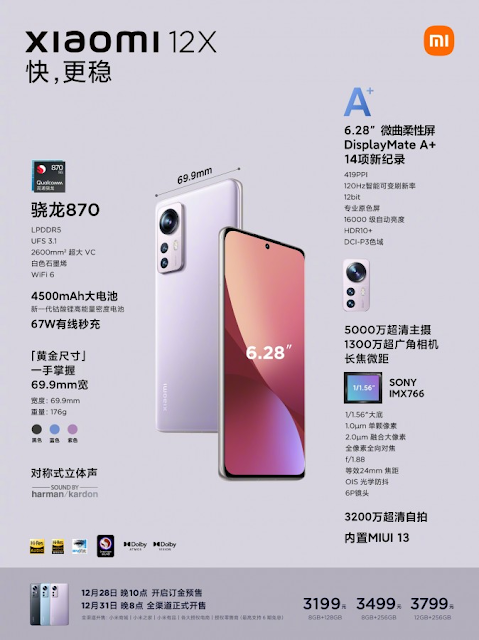After months of leaks and rumors, Xiaomi’s 12 series is now official with three entries - Xiaomi 12, Xiaomi 12 Pro and Xiaomi 12X. The vanilla model takes a more compact approach with its 6.28-inch screen while still fitting the very best Qualcomm Snapdragon 8 Gen 1 chip. The 12 Pro bumps up the size to 6.73-inches and also boasts the same SoC but it also adds an LTPO AMOLED display, bigger battery, faster charging and more capable camera hardware. The more budget-oriented Xiaomi 12X comes with the Snapdragon 870 SoC and similar size and specs to the Xiaomi 12.
Xiaomi 12 comes with the smallest screen
on a Xiaomi flagship since the Xiaomi Mi 8 days which is a welcome move for
compact flagship enthusiasts. The Samsung-made 6.28-inch AMOLED panel supports
FHD+ resolution and refreshes at up to 120Hz. There’s an under-display
fingerprint scanner while Corning’s Gorilla Glass Victus is here to fend of
scratches.
Xiaomi 12 brings the familiar 50MP Sony
IMX 766 sensor found in several of the 2021 crop of flagships from major
Android makers. It’s a 1/1.56” size with 2.0μm large pixels and OIS. The two
auxiliary sensors are a 13MP ultrawide snapper and a 50mm equivalent 5MP
tele-macro cam. Xiaomi engineers managed to shrink the vanilla 12’s motherboard
while still fitting an adequately sized cooling pad and all other key
components. The smaller Xiaomi 12 gets a 4,500 mAh battery with 67W wired fast
charging, 50W wireless charging and 10W reverse wireless top-ups. Xiaomi 12
series phones will ship with the brand new MIUI 13.
Xiaomi 12 series comes black, blue and
pink colors. There’s a special green vegan leather version for both phones. The
entry-level Xiaomi 12 with 8GB RAM and 128GB storage comes in at CNY 3,699
(US$ 580). There’s a midway 8/256GB model priced at CNY 3,999 (US$ 628) while the
12/256GB trim is CNY 4,399 (US$ 690). Xiaomi 12 series will be available from
December 31 in China. International pricing and availability will be detailed
at a later date.
The Pro model’s 6.73-inch panel comes with
1440p resolution and uses an LTPO 2.0 backplane which allows for variable
refresh rates of 1-120Hz depending on the task at hand. Xiaomi 12 Pro also
comes with an in-display fingerprint scanner and Gorilla Glass Victus
protection. Both Xiaomi 12 phones output 12-bit colors and can crank out up to
1,500 nits of brightness.
Xiaomi 12 Pro brings three 50MP cameras
with a Sony IMX707 sensor for the main shooter. It’s 1/1.28” in size and
supports pixel-binning with one big 2.44µm pixels and OIS. The second 50MP
sensor is a portrait lens while the third one brings an ultrawide module. CyberFocus
is Xiaomi’s self-developed fast auto-focus tech which manages to keep a lock on
subjects’ faces and other background elements. Xiaomi is also boasting a new
night mode algorithm that should capture more light in dimly lit areas while
keeping noise levels in check.
There’s a 4,600 mAh battery split into two
cells that charge at 120W via cable and up to 50W wirelessly. Xiaomi also added
its own in-house Surge P1 charging chip to help handle power management. Xiaomi
12 Pro starts at an 8/128GB trim which retails for CNY 4,699 (US$ 738), the
8/256GB model is CNY 4,999 (US$ 785) and the top spec’d 12/256GB model is CNY 5,399
(US$ 848). Xiaomi 12 series will be available from December 31 in China.
International pricing and availability will be detailed at a later date.
Xiaomi 12X is the third member of the
Xiaomi 12 series. It’s a slightly less capable version of the vanilla Xiaomi 12
with the same 6.28-inch 120Hz AMOLED display, capable triple camera setup and
4,500 mAh battery, and 67W charging. The key difference comes in the chipset
department where the 12X goes with the Snapdragon 870 instead of the flagship
Snapdragon 8 Gen 1 chip. There’s no wireless charging nor reverse wireless
charging here.
Xiaomi 12 X also comes in the same black,
blue and pink colors as its siblings. It starts at CNY 3,199 (US$ 502) for the
8/128GB trim and maxes out at CNY 3,799 (U $ 596) for the version with 12GB RAM and
256GB storage. The phone will be available in on December 31 in China.
International pricing and availability will be detailed at a later date.







